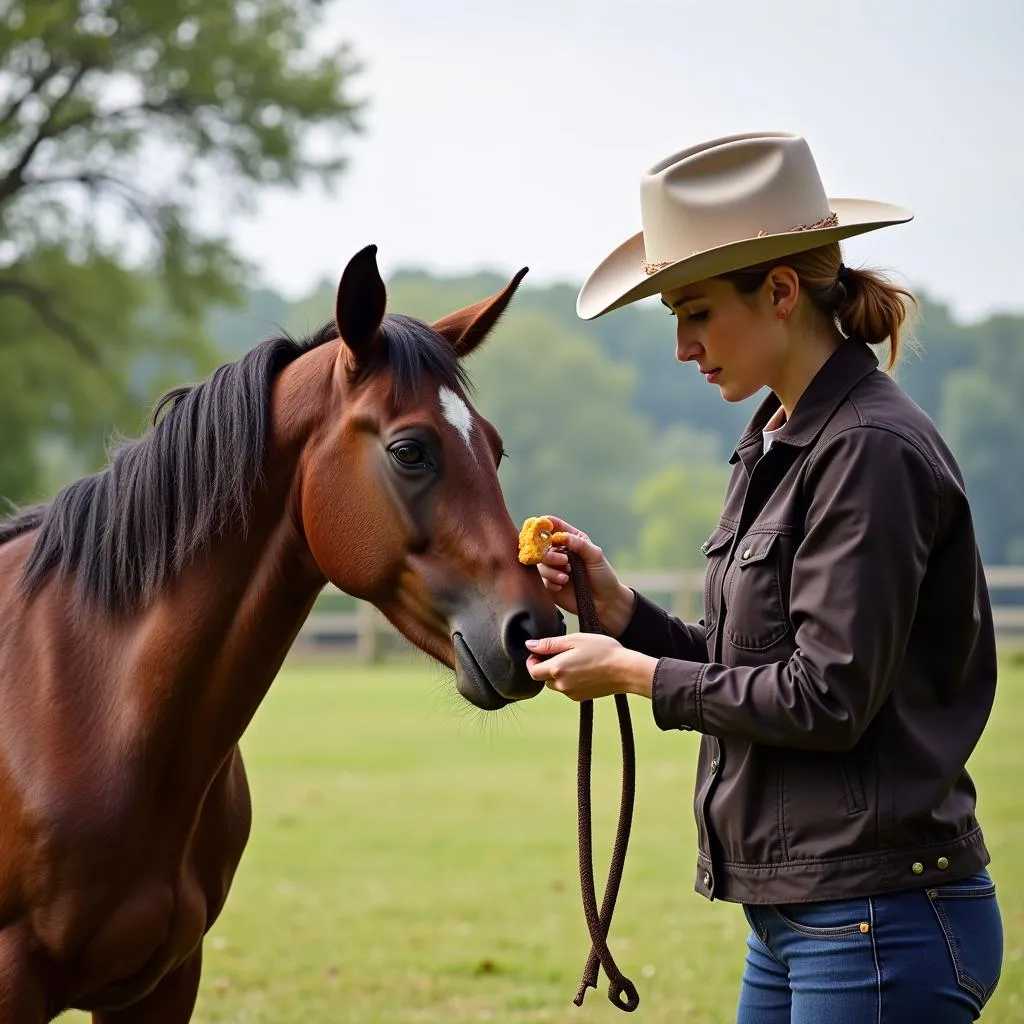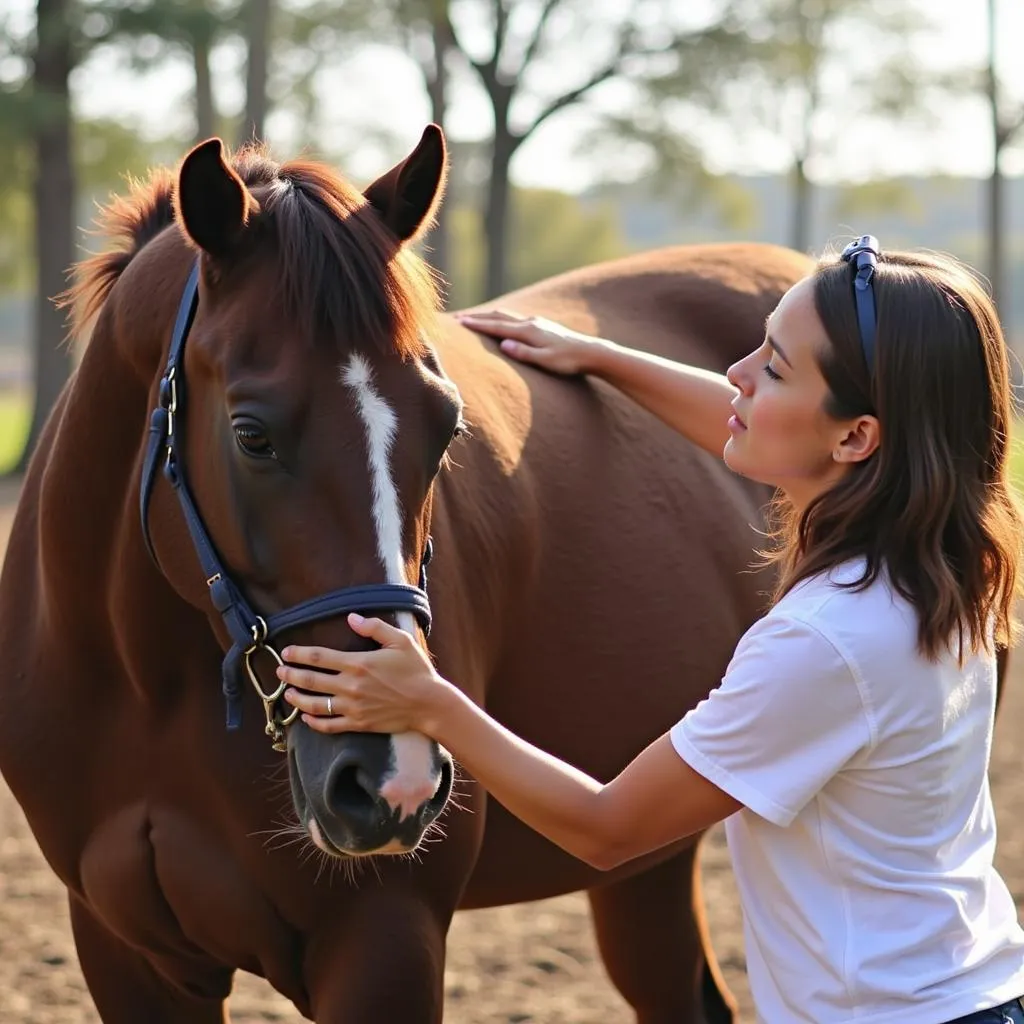Fisting A Horse, a term used to describe the act of inserting a hand into a horse’s rectum, is a dangerous and unethical practice that should never be undertaken. This article will provide a comprehensive guide on the reasons why fisting a horse is harmful and explain the importance of responsible horse handling practices.
Why Fisting a Horse Is Harmful
Fisting a horse is a serious act that can have severe consequences for both the horse and the individual involved. The horse’s rectum is incredibly sensitive and prone to injury, and forceful insertion of any object can cause:
- Severe internal injuries: The rectum is a delicate part of the horse’s digestive system and can easily be torn or punctured by a hand.
- Infection: The rectum is a breeding ground for bacteria, and any injury can lead to infection.
- Psychological trauma: Even if no physical harm occurs, fisting a horse can cause psychological distress and damage the horse’s trust in humans.
The Ethical Implications of Fisting a Horse
Beyond the potential physical harm, fisting a horse is ethically wrong. Horses are sentient beings that deserve respect and humane treatment. The act of fisting a horse violates their natural boundaries and inflicts pain and suffering.
Responsible Horse Handling Practices
Responsible horse handling involves treating horses with respect and understanding their natural behaviors. This includes:
- Using positive reinforcement: Rewarding desired behaviors with treats, praise, and gentle touch encourages cooperation.
- Maintaining a calm and respectful demeanor: A horse can sense fear and anxiety, and responding to them with calmness will create a safe and trusting environment.
- Avoiding any physical contact that causes pain or distress: This includes avoiding forceful or invasive actions like fisting.
- Seeking professional help: If you are having difficulties handling your horse, consult a certified equine professional for guidance and training.
“Horses deserve to be treated with respect and kindness,” states Dr. Emily Carter, a renowned equine veterinarian and author. “Fisting a horse not only causes physical harm but also violates their dignity and trust.”
Understanding the Horse’s Perspective
It’s important to remember that a horse’s rectum is a vital part of their digestive system. They may react defensively and violently if they perceive a threat to this area. “Think about how you would feel if someone tried to insert their hand into your rectum,” adds John Davis, an experienced horse trainer and advocate for ethical animal care. “It’s an invasive and painful experience that can cause serious harm.”
The Importance of Education
The practice of fisting a horse is often rooted in misinformation and a lack of understanding. By educating ourselves about the dangers and ethical implications of this behavior, we can help create a safer and more respectful environment for horses.
FAQs
Q: Is there any situation where fisting a horse is acceptable?
A: Absolutely not. Fisting a horse is never acceptable under any circumstance.
Q: What are some alternative methods for managing a horse’s digestive health?
A: Consult a veterinarian for appropriate solutions, such as dietary adjustments, probiotics, or other interventions.
Q: How can I learn more about responsible horse handling?
A: Seek guidance from experienced equine professionals, enroll in training courses, or join organizations dedicated to ethical animal care.
Q: Can I use my hand to stimulate a horse’s urination or defecation?
A: No, this is also considered harmful and can cause distress and injury.
Q: How do I report suspected animal abuse or neglect?
A: Contact your local animal welfare agency or animal control department.
Q: What if I need help handling my horse?
A: Don’t hesitate to seek professional help from a certified equine trainer or behaviorist. They can provide guidance and training techniques to improve your communication with your horse.
It is crucial to remember that horses are complex animals with unique needs. Treating them with respect, kindness, and understanding is essential for their well-being and safety. Always prioritize ethical and responsible horse handling practices to ensure a safe and harmonious relationship with your equine companion.
 Horse owner should not attempt to fist their horse
Horse owner should not attempt to fist their horse
 Horse trainer teaching horse a trick with a treat
Horse trainer teaching horse a trick with a treat
 A horse owner grooming their horse
A horse owner grooming their horse
If you have any further questions or require assistance with handling your horse, please reach out to us. We are here to help you create a safe and fulfilling relationship with your equine companion.
Call us at: 0772127271
Email us at: [email protected]
Visit us at: QGM2+WX2, Vị Trung, Vị Thuỷ, Hậu Giang, Việt Nam.